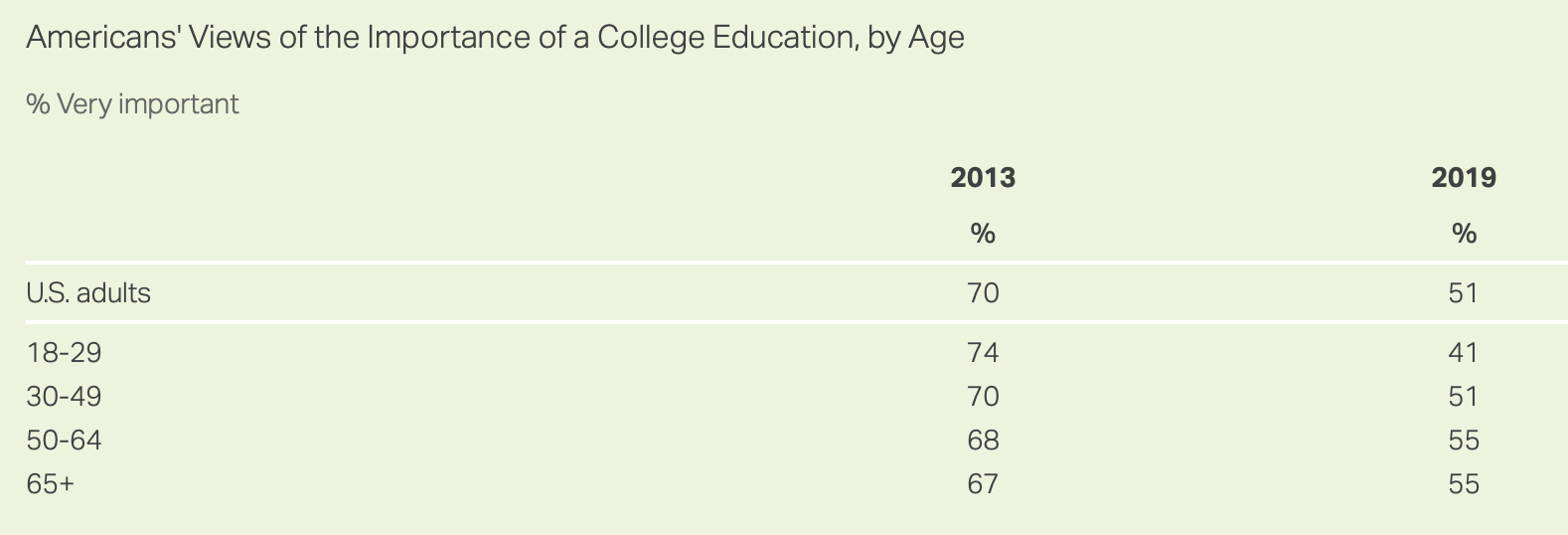December 20, 2019
Hi there,
This week's note is a short one covering:
- The roll-out of new labor laws targeting the gig economy, especially the early impacts of California's, which taks effect on January 1, 2020
- The declining importance of higher education according to Americans
If you are celebrating Christmas or Hannaukuh in the coming week, I hope you enjoy!
As always, I'd love to hear any reactions or thoughts from you. If you know someone interested in these topics, thanks for passing this note on to them!
A/ New "pro-worker" labor regulations causing some damage
California law AB5 will take effect in January, and some workers are losing their freelance positions as a result. For instance, Vox Media cut hundreds of its freelancers in the state. Its supporters passed the law to tighten labor regulations for the gig economy and limit businesses' ability to classify workers as independent contractors. But its broad drafting has many workers and firms understandably concerned. Translators, truck drivers and others have begun to find out they may be losing their freelance positions.
Uber, on the other hand, is trying to thread a needle through the requirements of the new law so that it can continue classifying workers as independent contractors. Drivers in California will now be able to see a rider's destination before accepting a ride and will be able to decline as many rides as they want without losing rewards.
While this is a California law as of January 1, new labor laws are a national issue. There is a big gap between what full-time employees get from employers and what contractors get, from job protections, benefits and more. This law reflects a broader popular demand for lawmakers to do something to address that gap and to regulate gig work in new ways. New Jersey is already in the process of passing similar legislation to the California law, and the state of New York is considering legislation targeting gig work.
The California law misses the mark with a sort of "Make-America-Great-Again" thinking—not of course in the Trump/Republican sense. Rather than address distinct features of the modern economy, AB5 tries to force the world to conform to the models of the past. In particular, AB5 reinforces the two job classifications that already exist, employees and independent contractors, and makes it much more difficult for companies to use the latter. This fails to consider the features of the gig economy that make it different (both positives and negatives) and is worse for it.
The law and the legislator who championed it also don't seem to care if workers want alternative employment options additionally or instead. In response to stories on Twitter of freelancers and others losing their positions, San Diego-based Assemblywoman Lorena Gonzalez showed no doubts or sympathy, writing:
These were never good jobs. No one has ever suggested that, even freelancers.
B/ Turning point for how we think about higher education?
Gallup released a new poll showing a sharp drop in the share of Americans who see a college education as "very important" and an uptick in those seeing one as "not too important":

The drop is even sharper for young people:

Hopefully, this opens up more discussion and action to improve higher education and expand the landscape of alternatives.
